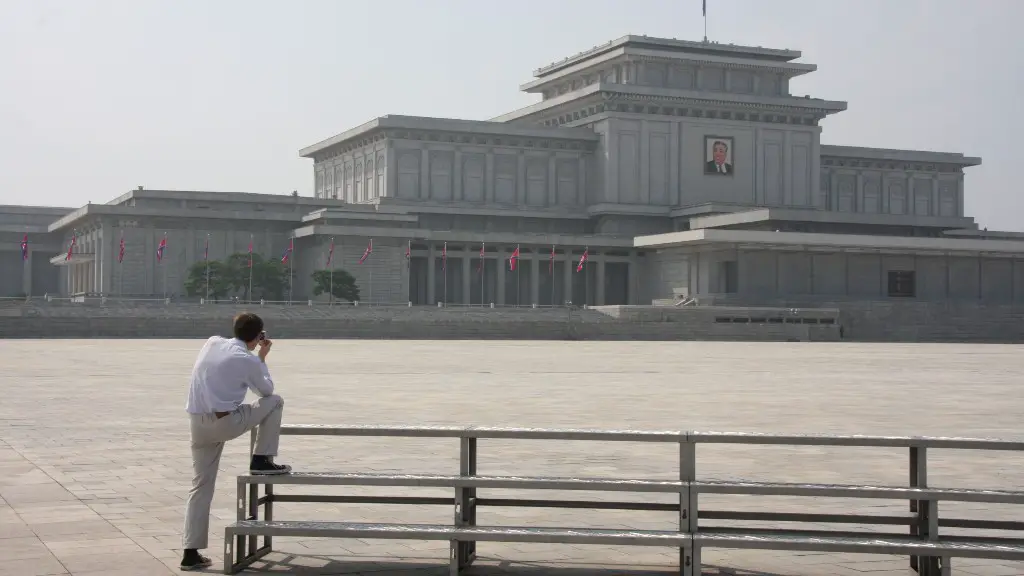What is Going On Between North Korea and America?
For much of the last 60 years, the relationship between North Korea and the United States has been strained, to say the least. The two countries have engaged in a cycle of volatility, with skirmishes and stand-offs resulting in a state of near-constant tension. Despite a few moments that hinted at thawing relations, the two countries remain far apart on many issues and are engaged in a dispute that shows no signs of abating. This article will provide a background on what has been going on between the two countries, data from the recent period of hostilities, the perspectives from experts in the field, and analysis and insight from the author on what has been occurring.
Background Information
The state of North Korea gained independence from its former occupier, Japan, after World War II. Following the war, the country was handed over to the Soviet Union, which allowed it to create a communist government. This was seen by the United States as a direct threat to their own security, leading to a Cold War proxy war between the two powers, in which North Korea generally sided with the Soviets. North Korea and the US had brief moments of thawing relations during the 90’s, with the US even offering aid to the nation for its nuclear program. In the 2000’s, however, the tension returned as North Korea began to pursue a more independent foreign policy and in 2006, tested a nuclear weapon.
Recent Period of Hostilities
The most recent period of enmity between the two countries began in 2017 when North Korea announced it was developing a new generation of intercontinental ballistic missiles, capable of reaching US soil. The US responded with a series of crippling economic sanctions, further exacerbating tensions. This standoff continued for most of 2018 and 2019, with North Korea continuing to test its weapons and the US continuing to impose economic sanctions. However, in 2020, tensions suddenly shifted as the two nations began to engage in a series of diplomatic exchanges. This led to the first ever meeting between a sitting US president, Donald Trump, and North Korean leader Kim Jong-Un.
Expert Perspectives
Experts in the field agree that the current period of diplomacy has been unprecedented. For decades, the two nations had appeared unwilling to engage in any kind of substantive dialogue, much less hold a face-to-face meeting. Many experts have praised the decision by both sides to engage in dialogue, however, they remain cautious and have voiced concerns about North Korea’s continued missile testing. While it appears that the two countries have reached an agreement to reduce tensions, experts have noted that there is still a long way to go before the two countries reach any kind of substantial agreement.
Analysis and Insight
The recent period of diplomacy demonstrates the desire on both sides to reduce the tension and find a peaceful resolution to the dispute. While it is encouraging to see the two countries engaging in dialogue, it is clear that the underlying issues are still far from resolved. North Korea’s continued missile testing is a reminder of how fragile the current truce is. It is also important to note that while the dialogue has opened the door to future cooperation, the two nations still have a long way to go before any lasting agreement is reached.
Impact on International Relations
The tension between North Korea and the US has had a profound effect on international relations. The international community is largely in support of the current diplomatic efforts but many nations remain wary of the situation. China, in particular, has been outspoken in its criticism of US policy towards North Korea and has attempted to use its economic leverage to pressure the US into a more conciliatory position. Despite this, the US has remained firm in its stance and has continued to impose economic sanctions on North Korea.
The situation is further complicated by the fact that North Korea still retains many of its military forces, as they remain a nuclear weapons state. This has caused further tension as nations scramble to contain the situation and ensure that peace is maintained in the region. In addition to this, the US continues to maintain a strong military presence in East Asia, leading to further potential for conflict.
Consequences for North Korea
The conflict between North Korea and the US has had severe consequences for the nation. The US has imposed stringent economic sanctions on North Korea, which has resulted in extreme poverty and deprivation. This has also led to a severe lack of access to medical care and essential services, which has exacerbated the humanitarian situation in the nation. In addition to this, the US has also placed restrictions on North Korean citizens travelling abroad, further limiting the nation’s ability to develop its economy and access global markets.
Furthermore, North Korea’s relationship with the US has resulted in increased isolation from the international community. This has had a devastating effect on the nation, as it has limited their access to global markets and resources, as well as impeding the nation’s ability to develop. This has also resulted in a loss of diplomatic prestige, further hindering the nation’s ability to progress.
Summary of Recent Events
As can be seen, the relationship between North Korea and the US has remained volatile for the last 60 years. Despite brief moments of détente, the two countries have remained largely at odds. In the years since 2017, the tension has risen to unprecedented levels, leading to the imposition of economic sanctions and increased military presence from the US. This has had devastating consequences for North Korea, which has faced further impoverishment and isolation from the international community. As of 2020, the two countries have entered into a period of diplomacy, with a meeting taking place between the two nations’ respective leaders. Despite this, there is still a long way to go before any lasting agreement is reached.
The Way Forward
Given the current situation, the way forward remains unclear. Despite the recent diplomatic exchanges, there is still much work to be done before any sustained agreement is reached. This hinges on the willingness of both sides to engage in meaningful dialogue and work towards a peaceful resolution that benefits both parties. In order to achieve this, it is essential that the US make clear its commitments to the denuclearisation of the Korean peninsula and the easing of economic sanctions, while North Korea must cease its pursuit of nuclear weapons and missile tests.
In the meantime, it is essential that the international community remain engaged in the process, providing both material and diplomatic support for the two countries as they attempt to find a way out of the deadlock. It is also important to note that these efforts should be pursued with a view to bringing about lasting peace and stability in the region, as any settlement should benefit both sides.
The Role of China
The presence of China in the region is also of great importance. China has long maintained a strong influence in the region and has traditionally been seen as an ally of North Korea. However, China has recently become more vocal in its criticism of the US and has attempted to use its economic power to pressure the US into a more conciliatory position. In addition, China has recently attempted to draw North Korea closer to itself, in an effort to increase Beijing’s influence in the region.
However, despite this, it is important to note that China’s interests in the region differ from those of the US and North Korea. While it is possible that China could be involved in any future peace agreement, it is unlikely that they would play a major role as they are primarily driven by economic interests, not geopolitical ones.
Role of South Korea
The role of South Korea in the dispute between North Korea and the US is also of great importance. South Korea is a key US ally in the region and is likely to be heavily involved in any diplomatic negotiations between the two sides. South Korea is also uniquely positioned to act as a mediator between the two countries, as they have close ties to both sides. In addition, South Korea is keen to ensure the peace and stability of the region, as they are the most likely to suffer in the event of a conflict.
However, South Korea faces a difficult balancing act in this dispute, as they must remain a loyal ally to the US while also seeking to create closer ties with North Korea. South Korea must also take into account its own economic interests, as any disruption to the regional economy could have a severe impact on the nation.
Conclusion
The relationship between North Korea and the US is one of the most complex and contentious in the world. While the recent period of diplomacy may have eased tensions to some extent, the underlying issues remain unresolved and the two countries still appear to be at odds. However, it is clear that both sides are committed to finding a peaceful resolution to the dispute and it is up to the international community to help facilitate negotiations and provide support. Only then can a lasting agreement be reached and true peace and stability be achieved in the region.




